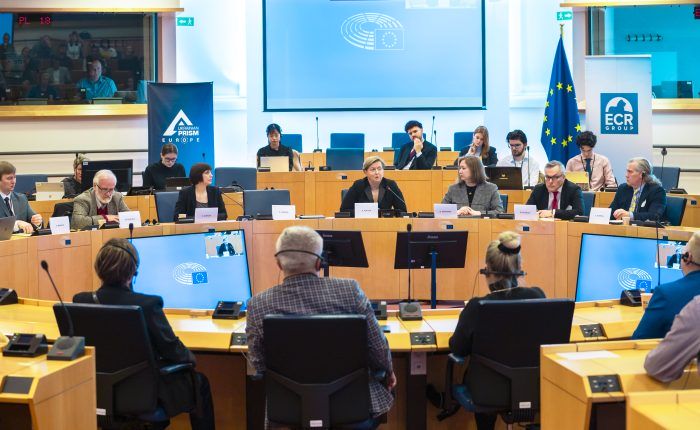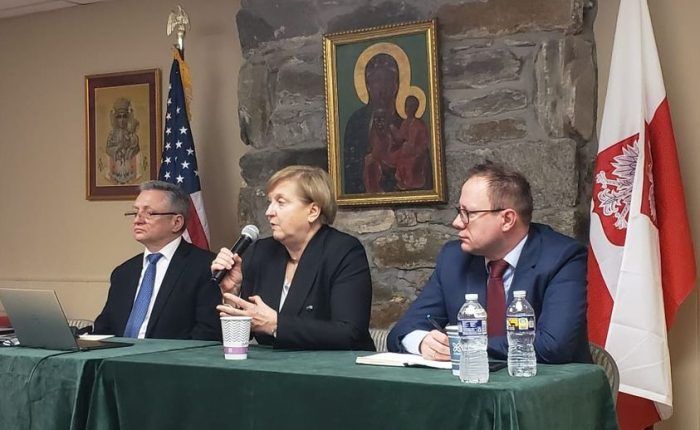„How to respond to the main challenges of the fragile security environment of Georgia?” – na takie pytanie odpowiedzieć mieli uczestnicy konkursu na esej, jaki Anna Fotyga zorganizowała we współpracy z Georgian Institute for Security Studies. Najciekawszą pracę przygotował Giorgi Lomtadze, który w nagrodę już za kilka tygodni rozpocznie staż w biurze europoselskim w Brukseli. Serdecznie gratulujemy!
Poniżej zamieszczamy treść zwycięskiego esej:
How to respond to the main challenges of the fragile security environment of Georgia?
Since Georgia gained its independence in 1991, the small country of 3.5 million has been facing numerous security challenges. These challenges were of endogenous and exogenous nature and were equally destructive. Georgia had to go through a civil war in 1991, a military coup which toppled the democratically elected president Zviad Gamsakhurdia, only to suffer a devastating war in Abkhazia soon afterwards in 1992-1993. In addition, lack of stable democratic institutions, weak judicial and law-enforcement practices led to the rise of informal economy and corruption, posing serious threat to Georgian statehood.
After the “Rose Revolution”, Mikheil Saakashvili’s government had begun to build democratic institutions and tilted Georgian path towards Euro-Atlantic integration. Government of Georgia (GoG) was gradually realizing the type of security threats it was facing and hastily took up reforming country’s democratic institutions, as well as the security architecture [1]. However, internal threats were accompanied by external ones as well, more specifically, the threat of Russian aggression and Russian-supported separatism.
Georgians perceived the path of Euro-Atlantic integration as a guarantee of security and sovereignty. In April 2008, during the NATO Bucharest summit, Georgia received a promise that it would become a member of NATO, which was followed by a brief, but devastating war with Russia, leaving almost 20% of Georgian territory occupied by Russian forces.
The purpose of this essay is to evaluate the current security dynamics in Georgia and beyond, in order to determine the major security threats that Georgia faces. The essay will describe the security environment of Georgia, present the nature of the security threats (whether they are internal or external) and will propose ways of responding to them, where such proposals are necessary and possible. The issue is complex and multifaceted, therefore, due to limited space, I will focus on the main security threats.
Security Environment of Georgia
Before analyzing the security environment of Georgia, certain clarifications on the term national security and security threats should be made. National security is a broad concept and there is scholarly debate whether it comprises matters of high politics (defense, military capabilities, sovereignty etc.) or matters related to low politics (economy, social matters, etc.) as well. This essay will employ a broader definition of security, which refers to the complex interdependence between high and low politics [2].
It is equally important to distinguish between security threats that are caused due to internal factors such as – poverty, unemployment, weak democratic institutions, corruption etc. and external ones – international terrorism, military aggression of a third state, external economic shocks etc. By classifying the threats in these two dimensions and establishing a link between them, we can determine a more comprehensive assessment of the security environment of Georgia.
Georgia has a very precarious security environment. Even though certain threats emanate from within, regional environment is volatile as well. Besides Russian aggression there are several other destabilizing factors. In South of Georgia, there is a frozen conflict between Armenia and Azerbaijan that could potentially once again transform into a full-fledged war, which would have negative consequences for Georgia. Just recently, on 24 of November 2015, Turkey downed a Russian jet near its Syrian border, which violated Turkish airspace [3]. This incident created allusions to a full-scale conflict between the military-economic powers of the Black Sea region. If such a conflict would take place, Georgia would find itself caught in between as a buffer zone. Additionally, the rise of Daesh is worrisome, as the terrorist group has open claims on the Caucasus, which potentially could provoke terrorist attacks in the region [4]. Therefore, Georgia has a very belligerent environment, which currently is least favorable for Georgia’s security.
Major External Security Threats
Considering the perilous environment of Georgia, external threats are plentiful. However, the most pressing security threats emanating from external factors are – Russian aggression and the “creeping occupation”, Russian agreements with the occupied territories and rise of Daesh in the Caucasus.
- Russian aggression and “creeping occupation” – As mentioned previously, Russia occupies 20% of Georgian territories after 2008. Even though there have not been any open hostilities between the sides since August 2008, aggressive behavior from Russia did not end after France brokered a cease-fire agreement between Georgia and Russia. Georgian citizens living near the occupied territories are being kidnapped on daily basis, despite the presence of the European Union Monitoring Mission (EUMM). Since 2009, more than 2,000 Georgian citizens have been detained by Russian border guards near Georgia’s occupied territories [5]. The so-called “creeping occupation” persists and barbed wire walls, as well as banners indicating “South-Ossetian borders” appear on the administrative borders of the occupied territories [6]. This practice is not only a destabilizing factor for Georgian citizens living near the administrative boundary line (ABL), but also threatens Georgia’s energy and economic security. The latest advances saw a portion of the BP-operated Baku–Supsa Pipeline in Georgia now fall under Russian control in the breakaway Tskhinvali region, potentially threatening Georgia’s energy security [7].
Possible responses – Diplomatic endeavors from our government are the most reasonable and reliable reactions to such aggressive actions. Georgian government is already denouncing the illegal acts on the international level (Geneva talks, UN, OSCE, EU partners and other forums), however, additional requests can be made such as:
- Requesting OSCE or UN led monitoring mission, in addition to the already existing EUMM. This would meet harsh opposition from the Russian side, nevertheless, even attempts to have more international presence on Georgian soil would serve as a deterrent against further advances in the Georgian territory via the “creeping occupation”;
- Implementation of the 2011 Swiss-brokered Georgia-Russia agreement on monitoring of trade between the two countries should be advocated further as well. This is a very important deal for Georgia’s sovereignty and security, which envisages hiring a “neutral private company” to carry out monitoring of cargo movement through breakaway regions.
- Russian agreements with the occupied territories – Russia signed „Alliance and Integration” agreements with Abkhazia (November 2014) and South Ossetia (March 2015), which aim to create a joint security and defense zone between Russia and the breakaway regions. This means more Russian military presence on Georgian soil posing great danger to its security.
Possible responses – Gaining international support against this act is an absolute necessity, which the GoG had succeed in. However, more Russian military presence might also mean more provocations, which should be addressed in a non-violent manner, without the use of military or other security forces, for this could be used as a premise for the Russian side to make more territorial advances.
- Rise of Daesh and threat for Georgia – In November 2015, a video was released by Daesh threatening Georgia by beheadings [8]. The threats themselves were released by Georgian nationals from Adjara region, which has a Muslim population. This threat must be taken seriously, as there are reported cases of Georgian citizens fighting in Syria and Iraq, mostly coming from Pankisi gorge (which also has a Muslim population). Furthermore, one of Daesh’s generals is an ex-military servant of the Georgian Army, Tarkhan Batirashvili, also known as Abu Omar al-Shishani, who has a vested interest in exporting jihad to Georgia.
Possible responses – It should be noted that the government has taken several efficient steps to respond to this threat.
- There have been several arrests of Georgian citizens affiliated with terrorist organizations (14 June 2015 and 22 November 2015);
- The government tried to shut down the recruiting website of Daesh that operated for Georgian nationals (https://xalifati.wordpress.com/).
However, additional steps could be taken to effectively respond to this threat –
- More engagement with partners in the fight against the terrorist organization and better coordination with special security services of neighboring states (especially of Turkey), which are used as a pathway from Georgia to Syria;
- Revision of strategic documents and including danger of terrorist threats in them, as well as revising the penal code and include stricter punishment for those involved in terrorist activities;
- Ensuring economic growth in the regions vulnerable to radicalization and recruitment, provide stimuli for investments and improve the living standards in those areas.
Major Internal Security Threats
Even though internal security threats are plentiful, I would point out two most noteworthy ones, which have an external dimension as well.
- Energy Security – In the past months, Minister of Energy of Georgia, Kakhi Kaladze, has met with CEO of the notorious Russian energy giant Gazprom – Alexey Miller. Apparently, the two have been discussing the possibility of Georgia buying gas from Gazprom [9]. This is an obvious threat to Georgia’s energy security, as Gazprom is well known to be a political tool in the hands of the Russian government. More dependence on Russian fossil fuels or energy imports is detrimental for the national interests of Georgia.
Possible responses – The negotiations on purchasing Russian gas should cease. If the Ministry of Energy is concerned with the growing demand on gas, it could be purchased from a reliable partner such as Azerbaijan, which already provides most of the gas that Georgia consumes in cheapest prices [10]. Other possibilities such as importing gas from Iran could be considered, as the nuclear deal with Iran promises new possibilities in this regard.
- Russian Propaganda – Anti-Western propaganda is a definite threat to Georgia’s Euro-Atlantic Aspirations, its democratic development and statehood. The propaganda is based on myths and disinformation spread by Russian media outlets and Kremlin’s satellite organizations in Georgia, most of it appealing to the traditional Orthodox values of Georgians, portraying the “West” as the opposite of these values, whereas Russia is shown as the protector of shared values.
Possible responses – Countering Russian propaganda with facts is the key to solving this issue. Recently, EU has set up a task force that debunks Russian propaganda targeting EU citizens and citizens of EU partners, including Georgia [11]. Information from the task force could be disseminated in Georgia to provide facts about the main myths that Russian satellites propagate. The government can also promote cooperation with non-governmental and civil society organizations (CSO), which work on the issue as well, organize meetings with municipalities and self-governing bodies to inform them about the disinformation.
Conclusion
Therefore, we can see that Georgia faces several internal and external security threats and has to respond to them in a very perilous environment. Only through reacting with diplomatic means, coordinating with partners, and adjusting strategic documents can Georgia deal with these threats efficiently. Constant support of the international community, as well as government’s communication with the population and the CSOs is necessary to respond to the challenges of the fragile security environment of Georgia.
Bibliography:
[1] Aliyev, Huseyn, “The Effects of the Saakashvili Era Reforms on Informal Practices in the Republic of Georgia”, Studies of Transition States and Societies”, vol. 6, no. 1, pp. 19-33.
[2] Jackson, Robert & Georg Sørensen. “Introduction to International Relations: Theories and approaches”, 3rd ed. Oxford, New York: Oxford University Press, 2007.
[3] Macfarquhar, Neil & Seven Erlanger, “NATO-Russia Tensions Rise after Turkey Downs Jet”, The New York times, 24 November 2015, retrieved 6 December 2015, http://www.nytimes.com/2015/11/25/world/europe/turkey-syria-russia-military-plane.html?_r=0.
[4] Gambhir, Harleen, “ISIS Declares Governorate in Russia’s North Caucasus Region”, Institute for the Study of War, 23 June 2015, retrieved 7 December 2015, http://understandingwar.org/backgrounder/isis-declares-governorate-russia%E2%80%99s-north-caucasus-region#sthash.QkYHHSXU.dpuf.
[5] “Russian soldiers kidnap two Georgian farmers near occupied Tskhinvali”, agenda.ge, 31 October 2015, retrieved 8 December 2015, http://agenda.ge/news/45488/eng.
[6] [7] “Creeping occupation: Russia advances 2km into Georgian territory”, agenda.ge, 12 July 2015, retrieved 6 December 2015, http://agenda.ge/news/38872/eng.
[8] Sidway, Ralph, “Islamic State video threatens Georgians with beheadings, caliphate”, Jihad Watch, 24 November 2015, retrieved 10 December 2015, http://www.jihadwatch.org/2015/11/islamic-state-video-threatens-georgians-with-beheadings-caliphate.
[9] [10] “Gazprom Tries to Tempt Georgia Away From Azeri Gas”, The Jamestown Foundation, 10 November 2015, retrieved 12 December 2015, http://oilprice.com/Latest-Energy-News/World-News/Gazprom-Tries-To-Tempt-Georgia-Away-From-Azeri-Gas.html.
[11] “Tiny EU task force set up to counter Russian propaganda”, euractiv.com, 28 August 2015, retrieved 9 December 2015, http://www.euractiv.com/sections/global-europe/tiny-eu-task-force-set-counter-russian-propaganda-317148.



